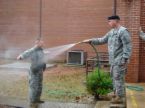 The use of force as it pertains to corrections and law enforcement is a cloudy and unfortunately not a well defined animal. I don’t understand why the use of force is not trained more throughout the country on the fundamentals, legal allowances and court cases regarding the use of force and less on the administrative strategies of what not to do. “The military trains and trains and trains and rarely fights, whereas correctional officers fight and fight and fight, but rarely train.” There are a few theories that “try” to explain why most correctional officers do not train with the same integrity and intensity as their military cousins. The only one in my opinion that cannot truly be accepted is that budget and time restraints make it difficult. This particular officer initiated action is probably the most feared and controversial and has put more officers on the street and into the jail cells that they as correctional officers patrol everyday. In my opinion I believe that officers are more afraid of being sued than they are of being assaulted while on duty. Read more…
The use of force as it pertains to corrections and law enforcement is a cloudy and unfortunately not a well defined animal. I don’t understand why the use of force is not trained more throughout the country on the fundamentals, legal allowances and court cases regarding the use of force and less on the administrative strategies of what not to do. “The military trains and trains and trains and rarely fights, whereas correctional officers fight and fight and fight, but rarely train.” There are a few theories that “try” to explain why most correctional officers do not train with the same integrity and intensity as their military cousins. The only one in my opinion that cannot truly be accepted is that budget and time restraints make it difficult. This particular officer initiated action is probably the most feared and controversial and has put more officers on the street and into the jail cells that they as correctional officers patrol everyday. In my opinion I believe that officers are more afraid of being sued than they are of being assaulted while on duty. Read more…
Tracy Barnhart use of force
 I have been asked to do a third part in this special use of force segment training articles. There is one topic that I enjoy more than no other to talk about, and that is the use of force. In this article specifically, I was asked about techniques to utilize so officers can use that actually work during restraints. My answer is that no technique that I could ever write about in a training article or that can be learned from reading this and then applied correctly. I can however, give you some basic principals that you can take away and seek out a good martial arts program in order to gain further knowledge. Read more…
I have been asked to do a third part in this special use of force segment training articles. There is one topic that I enjoy more than no other to talk about, and that is the use of force. In this article specifically, I was asked about techniques to utilize so officers can use that actually work during restraints. My answer is that no technique that I could ever write about in a training article or that can be learned from reading this and then applied correctly. I can however, give you some basic principals that you can take away and seek out a good martial arts program in order to gain further knowledge. Read more…
Tracy Barnhart Mental Preperation
 I am a big advocate of continuing education on job specific areas throughout your career. The type of information I attempt to give my students is what they can use that night or their next shift. When we talk about methods of attack I mean how, or the most probable way that an inmate or criminal will attack you. I talked about the red light green light indicator theory in my article on verbal and non-verbal indicators to assault. In this article I will attempt to give you the specific ways that you will be attacked or the best way for you to physically respond so that you can anticipate and react properly.
I am a big advocate of continuing education on job specific areas throughout your career. The type of information I attempt to give my students is what they can use that night or their next shift. When we talk about methods of attack I mean how, or the most probable way that an inmate or criminal will attack you. I talked about the red light green light indicator theory in my article on verbal and non-verbal indicators to assault. In this article I will attempt to give you the specific ways that you will be attacked or the best way for you to physically respond so that you can anticipate and react properly.
Read more…
Tracy Barnhart use of force
 So you want to be a corrections officer; it’ something that you have wanted to do ever since you were bullied on the schoolyard. “Whoa; wait a minute Mr. Barnhart; are you saying that some corrections and law enforcement officers are vindictive?” No I’m not making that generalization to all, but, some; well let me say it like this… “Everyone needs a job; but not everyone needs this job.”
So you want to be a corrections officer; it’ something that you have wanted to do ever since you were bullied on the schoolyard. “Whoa; wait a minute Mr. Barnhart; are you saying that some corrections and law enforcement officers are vindictive?” No I’m not making that generalization to all, but, some; well let me say it like this… “Everyone needs a job; but not everyone needs this job.”
Have you ever met an officer who could piss off the Pope? The officer who always seems to have the most physical restraints and reportable incidents? Well I am going to reference my good friend Gary Klugiewicz after I saw one of his informative verbal defense video clips. I am taking what he brought to light and expounding on the topic. Read more…
Tracy Barnhart Mental Preperation, Misconduct / Curruption
I can remember back in the early 1990’s when I was a rookie police  cadet going through the academy. At that time everything we did in training was because of officer survival and obtaining the street survival mindset so that we would not become a statistic on a wall plaque somewhere. We were constantly drilled on how to act and to do things a certain way, how to become proficient with our weapon systems and how to, at all costs, go home at the end of our shifts. I have since changed careers into corrections and the same outlook on officer survival and the survival mindset has not been grasped by our administrators or officers. I believe the total outlook of corrections administrators as it pertains to officer survival training I believe is one of “sink or swim” or “It’s not that serious.”
cadet going through the academy. At that time everything we did in training was because of officer survival and obtaining the street survival mindset so that we would not become a statistic on a wall plaque somewhere. We were constantly drilled on how to act and to do things a certain way, how to become proficient with our weapon systems and how to, at all costs, go home at the end of our shifts. I have since changed careers into corrections and the same outlook on officer survival and the survival mindset has not been grasped by our administrators or officers. I believe the total outlook of corrections administrators as it pertains to officer survival training I believe is one of “sink or swim” or “It’s not that serious.”
Read more…
Tracy Barnhart Mental Preperation
 I have seen a consensus all across the country about institutional contraband and the desire to stop it. Especially stopping the introduction of cellular telephones being difficult to trace. You will never totally eliminate the contraband unless you automate personnel at your facilities with robots and totally take away the human factor. As long as there are people to bewilder, manipulate and intimidate there will always be contraband. I heard a story today where a mother of an inmate French kissed her son in visitation, passing contraband through her mouth into his. I mean, how are you going to stop that? In this article I want to talk about the “human factor” identifying people who are bringing contraband into the facility by staff, visitors, and volunteers and how to tell they are dirty. Read more…
I have seen a consensus all across the country about institutional contraband and the desire to stop it. Especially stopping the introduction of cellular telephones being difficult to trace. You will never totally eliminate the contraband unless you automate personnel at your facilities with robots and totally take away the human factor. As long as there are people to bewilder, manipulate and intimidate there will always be contraband. I heard a story today where a mother of an inmate French kissed her son in visitation, passing contraband through her mouth into his. I mean, how are you going to stop that? In this article I want to talk about the “human factor” identifying people who are bringing contraband into the facility by staff, visitors, and volunteers and how to tell they are dirty. Read more…
Tracy Barnhart contraband control contraband control, control, federal, security, texas
 I have written many training articles and trained many individuals who I hope never need the tactics and strategies that I have shown. I often wonder while pondering and reminiscing of old times hoping that I told each student everything that I knew or have shown them the details of the tactics necessary to subdue the resisting individual. However, I always return to the same thought, “what makes a warrior?” In a very real sense, corrections employees serve more time in prison than many inmates, they just serve it in eight-hour installments! The famous criminologist, James B. Jacobs noted, “A career correctional officer in effect commits himself to a life sentence in prison.”
I have written many training articles and trained many individuals who I hope never need the tactics and strategies that I have shown. I often wonder while pondering and reminiscing of old times hoping that I told each student everything that I knew or have shown them the details of the tactics necessary to subdue the resisting individual. However, I always return to the same thought, “what makes a warrior?” In a very real sense, corrections employees serve more time in prison than many inmates, they just serve it in eight-hour installments! The famous criminologist, James B. Jacobs noted, “A career correctional officer in effect commits himself to a life sentence in prison.”
Read more…
Tracy Barnhart Mental Preperation
 The use of force as it pertains to corrections and law enforcement is a cloudy and unfortunately not a well defined animal. I don’t understand why the use of force is not trained more throughout the country on the fundamentals, legal allowances and court cases regarding the use of force and less on the administrative strategies of what not to do. “The military trains and trains and trains and rarely fights, whereas correctional officers fight and fight and fight, but rarely train.” There are a few theories that “try” to explain why most correctional officers do not train with the same integrity and intensity as their military cousins. The only one in my opinion that cannot truly be accepted is that budget and time restraints make it difficult. This particular officer initiated action is probably the most feared and controversial and has put more officers on the street and into the jail cells that they as correctional officers patrol everyday. In my opinion I believe that officers are more afraid of being sued than they are of being assaulted while on duty. Read more…
The use of force as it pertains to corrections and law enforcement is a cloudy and unfortunately not a well defined animal. I don’t understand why the use of force is not trained more throughout the country on the fundamentals, legal allowances and court cases regarding the use of force and less on the administrative strategies of what not to do. “The military trains and trains and trains and rarely fights, whereas correctional officers fight and fight and fight, but rarely train.” There are a few theories that “try” to explain why most correctional officers do not train with the same integrity and intensity as their military cousins. The only one in my opinion that cannot truly be accepted is that budget and time restraints make it difficult. This particular officer initiated action is probably the most feared and controversial and has put more officers on the street and into the jail cells that they as correctional officers patrol everyday. In my opinion I believe that officers are more afraid of being sued than they are of being assaulted while on duty. Read more…

 I have been asked to do a third part in this special use of force segment training articles. There is one topic that I enjoy more than no other to talk about, and that is the use of force. In this article specifically, I was asked about techniques to utilize so officers can use that actually work during restraints. My answer is that no technique that I could ever write about in a training article or that can be learned from reading this and then applied correctly. I can however, give you some basic principals that you can take away and seek out a good martial arts program in order to gain further knowledge.
I have been asked to do a third part in this special use of force segment training articles. There is one topic that I enjoy more than no other to talk about, and that is the use of force. In this article specifically, I was asked about techniques to utilize so officers can use that actually work during restraints. My answer is that no technique that I could ever write about in a training article or that can be learned from reading this and then applied correctly. I can however, give you some basic principals that you can take away and seek out a good martial arts program in order to gain further knowledge.  I am a big advocate of continuing education on job specific areas throughout your career.
I am a big advocate of continuing education on job specific areas throughout your career. So you want to be a corrections officer; it’ something that you have wanted to do ever since you were bullied on the schoolyard. “Whoa; wait a minute Mr. Barnhart; are you saying that some corrections and law enforcement officers are vindictive?” No I’m not making that generalization to all, but, some; well let me say it like this… “Everyone needs a job; but not everyone needs this job.”
So you want to be a corrections officer; it’ something that you have wanted to do ever since you were bullied on the schoolyard. “Whoa; wait a minute Mr. Barnhart; are you saying that some corrections and law enforcement officers are vindictive?” No I’m not making that generalization to all, but, some; well let me say it like this… “Everyone needs a job; but not everyone needs this job.” cadet going through the academy. At that time everything we did in training was because of officer survival and obtaining the street survival mindset so that we would not become a statistic on a wall plaque somewhere. We were constantly drilled on how to act and to do things a certain way, how to become proficient with our weapon systems and how to, at all costs, go home at the end of our shifts. I have since changed careers into corrections and the same outlook on officer survival and the survival mindset has not been grasped by our administrators or officers. I believe the total outlook of corrections administrators as it pertains to officer survival training I believe is one of “sink or swim” or “It’s not that serious.”
cadet going through the academy. At that time everything we did in training was because of officer survival and obtaining the street survival mindset so that we would not become a statistic on a wall plaque somewhere. We were constantly drilled on how to act and to do things a certain way, how to become proficient with our weapon systems and how to, at all costs, go home at the end of our shifts. I have since changed careers into corrections and the same outlook on officer survival and the survival mindset has not been grasped by our administrators or officers. I believe the total outlook of corrections administrators as it pertains to officer survival training I believe is one of “sink or swim” or “It’s not that serious.” I have seen a consensus all across the country about institutional contraband and the desire to stop it.
I have seen a consensus all across the country about institutional contraband and the desire to stop it. I have written many training articles and trained many individuals who I hope never need the tactics and strategies that I have shown. I often wonder while pondering and reminiscing of old times hoping that I told each student everything that I knew or have shown them the details of the tactics necessary to subdue the resisting individual. However, I always return to the same thought, “what makes a warrior?” In a very real sense, corrections employees serve more time in prison than many inmates, they just serve it in eight-hour installments! The famous criminologist, James B. Jacobs noted, “A career correctional officer in effect commits himself to a life sentence in prison.”
I have written many training articles and trained many individuals who I hope never need the tactics and strategies that I have shown. I often wonder while pondering and reminiscing of old times hoping that I told each student everything that I knew or have shown them the details of the tactics necessary to subdue the resisting individual. However, I always return to the same thought, “what makes a warrior?” In a very real sense, corrections employees serve more time in prison than many inmates, they just serve it in eight-hour installments! The famous criminologist, James B. Jacobs noted, “A career correctional officer in effect commits himself to a life sentence in prison.”